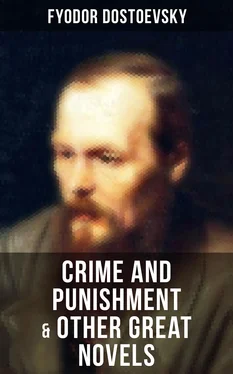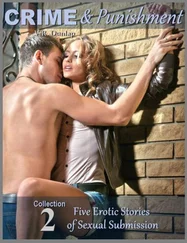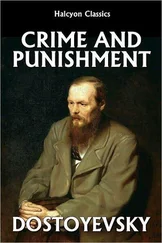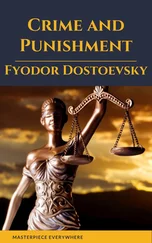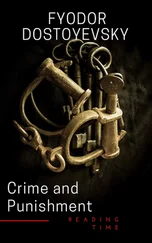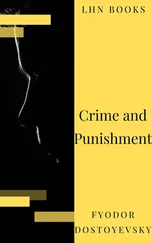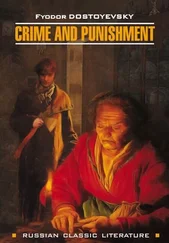“Oh, don’t trouble, please,” cried Raskolnikov and he suddenly broke into a laugh. “Please don’t trouble.”
Porfiry stood facing him, paused a moment and suddenly he too laughed. Raskolnikov got up from the sofa, abruptly checking his hysterical laughter.
“Porfiry Petrovitch,” he began, speaking loudly and distinctly, though his legs trembled and he could scarcely stand. “I see clearly at last that you actually suspect me of murdering that old woman and her sister Lizaveta. Let me tell you for my part that I am sick of this. If you find that you have a right to prosecute me legally, to arrest me, then prosecute me, arrest me. But I will not let myself be jeered at to my face and worried . . .”
His lips trembled, his eyes glowed with fury and he could not restrain his voice.
“I won’t allow it!” he shouted, bringing his fist down on the table. “Do you hear that, Porfiry Petrovitch? I won’t allow it.”
“Good heavens! What does it mean?” cried Porfiry Petrovitch, apparently quite frightened. “Rodion Romanovitch, my dear fellow, what is the matter with you?”
“I won’t allow it,” Raskolnikov shouted again.
“Hush, my dear man! They’ll hear and come in. Just think, what could we say to them?” Porfiry Petrovitch whispered in horror, bringing his face close to Raskolnikov’s.
“I won’t allow it, I won’t allow it,” Raskolnikov repeated mechanically, but he too spoke in a sudden whisper.
Porfiry turned quickly and ran to open the window.
“Some fresh air! And you must have some water, my dear fellow. You’re ill!” and he was running to the door to call for some when he found a decanter of water in the corner. “Come, drink a little,” he whispered, rushing up to him with the decanter. “It will be sure to do you good.”
Porfiry Petrovitch’s alarm and sympathy were so natural that Raskolnikov was silent and began looking at him with wild curiosity. He did not take the water, however.
“Rodion Romanovitch, my dear fellow, you’ll drive yourself out of your mind, I assure you, ach, ach! Have some water, do drink a little.”
He forced him to take the glass. Raskolnikov raised it mechanically to his lips, but set it on the table again with disgust.
“Yes, you’ve had a little attack! You’ll bring back your illness again, my dear fellow,” Porfiry Petrovitch cackled with friendly sympathy, though he still looked rather disconcerted. “Good heavens, you must take more care of yourself! Dmitri Prokofitch was here, came to see me yesterday — I know, I know, I’ve a nasty, ironical temper, but what they made of it! . . . Good heavens, he came yesterday after you’d been. We dined and he talked and talked away, and I could only throw up my hands in despair! Did he come from you? But do sit down, for mercy’s sake, sit down!”
“No, not from me, but I knew he went to you and why he went,” Raskolnikov answered sharply.
“You knew?”
“I knew. What of it?”
“Why this, Rodion Romanovitch, that I know more than that about you; I know about everything. I know how you went to take a flat at night when it was dark and how you rang the bell and asked about the blood, so that the workmen and the porter did not know what to make of it. Yes, I understand your state of mind at that time . . . but you’ll drive yourself mad like that, upon my word! You’ll lose your head! You’re full of generous indignation at the wrongs you’ve received, first from destiny, and then from the police officers, and so you rush from one thing to another to force them to speak out and make an end of it all, because you are sick of all this suspicion and foolishness. That’s so, isn’t it? I have guessed how you feel, haven’t I? Only in that way you’ll lose your head and Razumihin’s, too; he’s too good a man for such a position, you must know that. You are ill and he is good and your illness is infectious for him . . . I’ll tell you about it when you are more yourself. . . . But do sit down, for goodness’ sake. Please rest, you look shocking, do sit down.”
Raskolnikov sat down; he no longer shivered, he was hot all over. In amazement he listened with strained attention to Porfiry Petrovitch who still seemed frightened as he looked after him with friendly solicitude. But he did not believe a word he said, though he felt a strange inclination to believe. Porfiry’s unexpected words about the flat had utterly overwhelmed him. “How can it be, he knows about the flat then,” he thought suddenly, “and he tells it me himself!”
“Yes, in our legal practice there was a case almost exactly similar, a case of morbid psychology,” Porfiry went on quickly. “A man confessed to murder and how he kept it up! It was a regular hallucination; he brought forward facts, he imposed upon everyone and why? He had been partly, but only partly, unintentionally the cause of a murder and when he knew that he had given the murderers the opportunity, he sank into dejection, it got on his mind and turned his brain, he began imagining things and he persuaded himself that he was the murderer. But at last the High Court of Appeal went into it and the poor fellow was acquitted and put under proper care. Thanks to the Court of Appeal! Tut-tut-tut! Why, my dear fellow, you may drive yourself into delirium if you have the impulse to work upon your nerves, to go ringing bells at night and asking about blood! I’ve studied all this morbid psychology in my practice. A man is sometimes tempted to jump out of a window or from a belfry. Just the same with bell-ringing. . . . It’s all illness, Rodion Romanovitch! You have begun to neglect your illness. You should consult an experienced doctor, what’s the good of that fat fellow? You are lightheaded! You were delirious when you did all this!”
For a moment Raskolnikov felt everything going round.
“Is it possible, is it possible,” flashed through his mind, “that he is still lying? He can’t be, he can’t be.” He rejected that idea, feeling to what a degree of fury it might drive him, feeling that that fury might drive him mad.
“I was not delirious. I knew what I was doing,” he cried, straining every faculty to penetrate Porfiry’s game, “I was quite myself, do you hear?”
“Yes, I hear and understand. You said yesterday you were not delirious, you were particularly emphatic about it! I understand all you can tell me! A-ach! . . . Listen, Rodion Romanovitch, my dear fellow. If you were actually a criminal, or were somehow mixed up in this damnable business, would you insist that you were not delirious but in full possession of your faculties? And so emphatically and persistently? Would it be possible? Quite impossible, to my thinking. If you had anything on your conscience, you certainly ought to insist that you were delirious. That’s so, isn’t it?”
There was a note of slyness in this inquiry. Raskolnikov drew back on the sofa as Porfiry bent over him and stared in silent perplexity at him.
“Another thing about Razumihin — you certainly ought to have said that he came of his own accord, to have concealed your part in it! But you don’t conceal it! You lay stress on his coming at your instigation.”
Raskolnikov had not done so. A chill went down his back.
“You keep telling lies,” he said slowly and weakly, twisting his lips into a sickly smile, “you are trying again to show that you know all my game, that you know all I shall say beforehand,” he said, conscious himself that he was not weighing his words as he ought. “You want to frighten me . . . or you are simply laughing at me . . .”
Читать дальше
